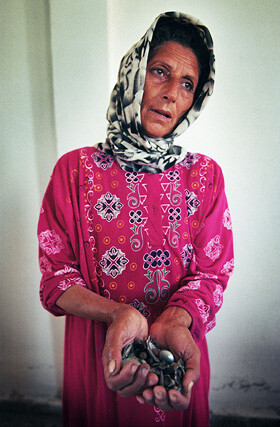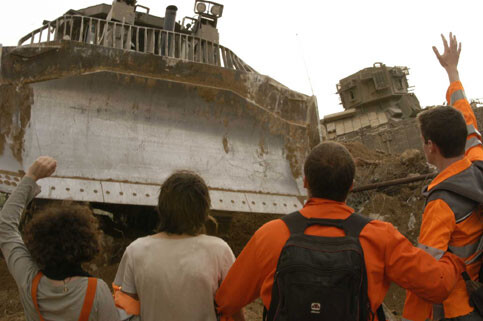The Electronic Intifada 15 May 2003


A swirling wind whips dust, sand, and garbage along a short, rutted street to the border. Tatters of old newspapers can get across, sailing away past the fence and out of this hell, yet the people living here cannot go anywhere.
Staying is not much of an option, either. Mere existence in occupied and besieged Rafah demands unimaginable strength and continuous courage. The only way anyone leaves Gaza is by leaving life itself. An extended military closure makes dying the only exit option.
All the pipes and drums of political rallies and remembrance day parades; all the ink of history books, policy papers, executive summaries, and polemical tracts; all the solemn newsbytes, sturm und drang and spin of media coverage are pointless here at the edge of Gaza.
Talk or yell, scream or rationalize, pontificate or analyze all you want, but it all boils down to this: A husband, a wife, and their three small children clinging to the vain hope of home and normalcy in a shattered neighborhood of demolished houses. A family without guns, passports, money or connections constantly watched and menaced by roving tanks, enormous bulldozers, buzzing drones, and lethal helicopters.
This is the Israeli-Palestinian conflict, the “Question of Palestine,” the “Middle East Crisis.” This is how far diplomacy, aid packages, political inducements, international conferences, declarations of principles, and dialogue groups have taken us: right here, to this jagged fence and ruined building under a dust-darkened sky. This is it: a 24/7, non-stop freak show of human rights violations and grave infractions of International Law and the Fourth Geneva Convention. Genocide on the installment plan.

A Palestinian woman living in Rafah displays Israeli shrapnel collected in her home, a sign of the ferocity and frequency with which residents are shelled. (Ronald de Hommel)
This is wrong. This is terrorism. This is evil.
So it is no surprise that the Israeli Government and its Army of Occupation do not want any foreign eyes, hearts, or minds poking about here in Rafah, at the edge of the edge, where dignity is disintegrating nearly as fast as the last remaining shell-pocked buildings, where the sound of something breaking might be a child’s hope, a family’s crockery, a man’s pride, a woman’s mind, or the international community’s body of laws. Don’t hear. Don’t ask. Don’t think. It’s not anything that concerns you.
If no one sees these massive rights abuses and daily, calculated cruelties, did they actually occur? If no one acknowledges that there are human beings here, living in the tiny spaces between the snipers’ cross hairs, are human rights even an issue? If no one hears the sobs of the bereaved or the screams of those deranged by the daily rape of the mind that is occupation, has anything really been lost?
This is the age of reason after all, and we, watching our televisions in the USA, are known to be reasonable people. Hence, whatever we cannot see, hear, smell, taste or touch really should be doubted, taken with a grain of salt, considered askance with our characteristic, street-savvy suspicion. We are no one’s dupes, after all; nobody is going to play on our sentiments with these maudlin, second-hand tales of woe about how the oppressed are suffering in some town whose name we cannot even pronounce.
We shall withhold judgment until we can decide for ourselves what is what. Maybe Christiane Amanpour or Ted Koppel will do a special segment….
The IDF acted quite reasonably when it decided to keep all those eyes, hearts, and minds far away from Rafah. With the new requirement that all visitors must sign a waiver excusing the IDF in advance from murder and mayhem, it’s unlikely that many hearts, minds, and eyes will ever make it into Gaza in the first place.

Members of the International Solidarity Movement confront an Israeli bulldozer in Rafah, under the watchful eye of a nearby Israeli watchtower, 6 April 2003. The photographer, Tom Hurndall, was shot 6 days later from a similar guard tower in Rafah, and was left clinically dead.
Best that your feet never find their way to this edge of inhumanity and despair. Best that the world keeps thinking of “the conflict” in terms of abstract propositions, hypothetical solutions, and diplomatic scenarios.
Go ahead and ponder your Road Maps from a distance, but keep the hell off this sandy road that leads to this jagged edge of Rafah. Let no one actually find the lane that leads to this huge, gaping hole of someone’s grave, someone’s wound, someone’s demolished house, someone’s shattered international legal system, someone’s failed hopes for a country that aspired to be a “light unto the nations.”
Best that you continue to assume, from afar, that you are in no way implicated in any of the events that will happen tonight as a husband and wife close the bullet-riddled front door of their battered house in Rafah and crouch in the darkness shielding their three small children from whizzing bullets, incoming artillery, and hovering Apache attack helicopters with all that they have left: tired bodies enclosing hearts filled with more love and pain than any jagged fence or military order could ever encompass.
Laurie King-Irani is one of the four co-founders of the Electronic Intifada. She teaches Social Anthropology in British Columbia and serves as North American Coordinator for the International Campaign for Justice for the Victims of Sabra and Shatila (www.indictsharon.net).





